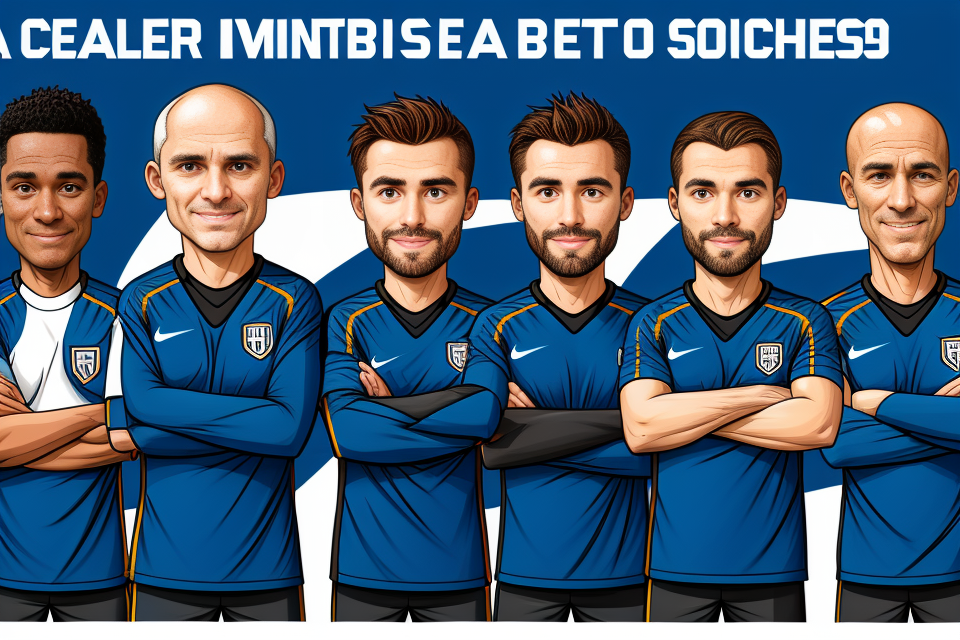If you’re a soccer enthusiast, you’ve probably wondered what it’s like to be a soccer coach. Coaching youth soccer is a challenging and rewarding experience that requires a unique blend of skills, including leadership, communication, and technical knowledge. In this article, we’ll take an inside look at the highs and lows of coaching youth soccer, and explore the many facets of this rewarding profession. Whether you’re a seasoned coach or just starting out, this article will give you a glimpse into the world of soccer coaching and what it takes to be successful. So lace up your cleats and get ready to learn about the challenges and rewards of coaching youth soccer.
The Role of a Soccer Coach
Responsibilities
- Planning and conducting practices: As a soccer coach, it is essential to create and implement effective training sessions that will help players improve their skills and techniques. This involves designing drills and exercises that target specific aspects of the game, such as ball control, passing, and shooting. Coaches must also ensure that practices are safe and enjoyable for all players, regardless of their skill level.
- Developing training programs: In addition to planning individual practices, coaches must also develop long-term training programs that will help players progress over time. This may involve setting goals for each player, creating a schedule of games and tournaments, and developing a plan for how players will be rotated and utilized during games.
- Scouting and recruiting players: Coaches must also be responsible for identifying and recruiting new players to join their team. This may involve scouting local leagues and tournaments, reaching out to players and parents, and conducting tryouts to assess players’ skills and potential.
- Building and maintaining relationships with players, parents, and other coaches: Successful soccer coaching requires strong interpersonal skills and the ability to build and maintain positive relationships with players, parents, and other coaches. This may involve communicating regularly with parents to keep them informed about team events and progress, as well as working collaboratively with other coaches to ensure that players are getting the best possible training and support.
- Managing and leading a team: Finally, soccer coaches must also be able to manage and lead their team effectively. This may involve setting expectations for player behavior and performance, resolving conflicts, and motivating players to perform at their best. Coaches must also be able to make tough decisions, such as rotating players in and out of games or benching players who are not meeting expectations.
Skills Required
A soccer coach plays a crucial role in shaping the lives of young athletes. In order to be successful, a soccer coach must possess a wide range of skills. Here are some of the most important skills required to be a successful soccer coach:
- Knowledge of the game: A soccer coach must have a deep understanding of the game, including its rules, strategies, and tactics. This knowledge will enable the coach to effectively teach players and make informed decisions during games.
- Communication and interpersonal skills: A soccer coach must be able to communicate effectively with players, parents, and other coaches. Good communication skills are essential for building trust and establishing a positive team culture.
- Leadership and organizational skills: A soccer coach must be able to lead a team and organize practices, games, and other events. This requires strong planning and organizational skills, as well as the ability to motivate and inspire players.
- Flexibility and adaptability: A soccer coach must be able to adapt to changing circumstances and adjust their coaching style as needed. This requires flexibility and the ability to think on your feet.
- Time management and commitment: A soccer coach must be able to manage their time effectively and commit to coaching year-round. This requires a strong work ethic and a commitment to the team’s success.
Overall, being a successful soccer coach requires a unique combination of skills, including knowledge of the game, communication and interpersonal skills, leadership and organizational skills, flexibility and adaptability, and time management and commitment. By developing these skills, a coach can help their team succeed both on and off the field.
The Challenges of Coaching Youth Soccer
Balancing Player Development and Winning
Coaching youth soccer comes with a unique set of challenges, one of which is balancing player development and winning. This involves finding the right balance between developing players’ skills and ensuring that they have fun while playing the sport. It also involves dealing with pressure from parents and the community to win games.
As a soccer coach, it is important to understand that the primary goal of youth soccer is to develop players’ skills and help them fall in love with the sport. While winning games is important, it should not be the only focus. However, this can be easier said than done, as many parents and community members place a high value on winning.
One way to balance player development and winning is to set realistic goals for the team. This means setting goals that are challenging but achievable, both in terms of player development and winning games. It is also important to communicate these goals to parents and the community, so that everyone is on the same page.
Another way to balance player development and winning is to focus on process rather than outcome. This means emphasizing the importance of hard work, effort, and improvement, rather than just winning games. By focusing on the process, players will be more likely to develop their skills and enjoy the sport, regardless of whether they win or lose.
Overall, balancing player development and winning can be a challenging aspect of coaching youth soccer. However, by setting realistic goals, focusing on the process, and communicating with parents and the community, it is possible to find the right balance and help players develop their skills while also enjoying the sport.
Managing Diverse Personalities and Behaviors
One of the biggest challenges of coaching youth soccer is managing the diverse personalities and behaviors of players. This involves dealing with players who have different learning styles, abilities, and personalities, as well as managing conflicts and challenging behaviors among players. Building a positive team culture and fostering a sense of belonging is also crucial.
Dealing with Different Learning Styles, Abilities, and Personalities
Youth soccer players come from diverse backgrounds and have unique learning styles, abilities, and personalities. As a coach, it is essential to recognize and understand these differences to create an inclusive and effective learning environment.
One way to manage these differences is to develop individualized training plans for each player, taking into account their strengths, weaknesses, and learning styles. This can involve providing extra support for players who need it, such as those with learning difficulties or language barriers.
Managing Conflicts and Challenging Behaviors
In any team, conflicts and challenging behaviors are inevitable. As a coach, it is crucial to address these issues promptly and effectively to maintain a positive team culture.
One approach is to establish clear expectations and rules for behavior from the outset of the season. This can include things like respecting teammates, coaches, and officials, as well as following the rules of the game. Coaches can also model positive behavior and reinforce good sportsmanship throughout the season.
Building a Positive Team Culture and Fostering a Sense of Belonging
Creating a positive team culture is essential for building a successful youth soccer team. This involves fostering a sense of belonging and promoting positive relationships among players.
One way to achieve this is to create team-building activities that encourage communication, collaboration, and trust. This can include things like scavenger hunts, group challenges, or team dinners. Coaches can also recognize and celebrate individual and team achievements throughout the season to build morale and foster a sense of pride.
Overall, managing diverse personalities and behaviors is a critical aspect of coaching youth soccer. By recognizing and addressing the unique needs and challenges of each player, coaches can create a positive and inclusive team culture that fosters growth, development, and success on and off the field.
Juggling Time and Resources
As a youth soccer coach, one of the biggest challenges is managing time effectively. Coaches often have to balance coaching responsibilities with family and work obligations, which can be quite demanding. In addition to this, coaches must also secure adequate training facilities and equipment, which can be difficult if the team does not have access to a dedicated field or facility.
Recruiting and retaining volunteers and assistants is another challenge that many youth soccer coaches face. Without enough help, coaches may find themselves overwhelmed and struggling to provide the support and guidance that their players need.
To address these challenges, coaches must learn to prioritize their time and resources effectively. This may involve delegating tasks to volunteers and assistants, scheduling practices and games during times that work best for everyone involved, and being creative when it comes to finding training facilities and equipment.
Despite these challenges, many coaches find that the rewards of coaching youth soccer far outweigh the difficulties. The opportunity to positively impact young lives and help them develop important life skills, such as teamwork and leadership, is what drives many coaches to continue coaching despite the challenges.
The Rewards of Coaching Youth Soccer
Seeing Players Grow and Improve
One of the most rewarding aspects of coaching youth soccer is witnessing the growth and improvement of players over time. As a coach, you have the opportunity to work with young athletes and help them develop their skills, confidence, and love for the game. Here are some of the ways you can see players grow and improve:
- Technical Skills: As a coach, you can help players improve their technical skills, such as dribbling, passing, and shooting. By providing them with repetition and feedback, you can help them develop their ability to control the ball and make decisions on the field.
- Tactical Knowledge: You can also help players improve their tactical knowledge, such as understanding the game better, reading the opposition, and making better decisions on the field. This can be achieved through small-sided games, scrimmages, and other training exercises that focus on decision-making and teamwork.
- Confidence: Coaching youth soccer can also help players build their confidence on and off the field. By providing positive feedback, encouragement, and support, you can help players believe in themselves and their abilities.
- Love for the Game: Finally, coaching youth soccer can help players develop a love for the game. By creating a positive and enjoyable environment, you can help players fall in love with soccer and want to continue playing for years to come.
Overall, seeing players grow and improve is one of the most rewarding aspects of coaching youth soccer. By providing a supportive and challenging environment, you can help players reach their full potential and achieve their goals and dreams.
Building Lasting Connections
One of the most rewarding aspects of coaching youth soccer is the opportunity to build lasting connections with players, parents, and other coaches. These connections can have a profound impact on the players’ lives, both on and off the field.
- Developing meaningful relationships with players:
- As a soccer coach, you have the unique opportunity to work closely with your players, building trust and fostering a sense of teamwork. You can also help players develop important life skills, such as communication, leadership, and resilience.
- By taking the time to get to know your players as individuals, you can better understand their strengths, weaknesses, and motivations. This allows you to tailor your coaching style to each player’s needs, helping them reach their full potential.
- Fostering a sense of community and belonging among players and their families:
- Youth soccer teams often serve as a hub for social interaction and community building. By organizing team events and activities, you can help players and their families develop strong bonds with one another.
- Additionally, soccer can provide a sense of belonging for players who may feel marginalized or excluded in other areas of their lives. By creating a welcoming and inclusive environment, you can help players feel valued and supported.
- Creating a positive impact on young people’s lives:
- As a soccer coach, you have the power to inspire and motivate young people to achieve their goals. By setting high expectations and providing positive feedback, you can help players develop confidence and self-esteem.
- Additionally, soccer can provide a much-needed outlet for physical activity and exercise, helping to combat childhood obesity and promote healthy lifestyles. By encouraging players to stay active and engaged, you can help them develop lifelong habits of wellness and fitness.
Personal Growth and Satisfaction
As a soccer coach, one of the most rewarding aspects of the job is the personal growth and satisfaction that comes with it. Here are some of the ways in which coaching youth soccer can lead to personal growth and satisfaction:
- Gaining knowledge and experience in coaching and youth development: As a soccer coach, you have the opportunity to learn and grow as a coach. You’ll gain knowledge about the game of soccer, as well as skills in coaching and youth development. This can be a rewarding experience for those who enjoy learning and personal growth.
- Continuously learning and improving as a coach: Coaching youth soccer requires ongoing learning and improvement. You’ll need to stay up-to-date with the latest coaching techniques, as well as adapt to the changing needs of your players. This can be a challenging but rewarding experience for those who enjoy personal growth and self-improvement.
- Finding personal fulfillment and satisfaction in giving back to the community: Coaching youth soccer can be a way to give back to the community and make a positive impact on young people’s lives. For many coaches, this sense of personal fulfillment and satisfaction is one of the most rewarding aspects of the job. It can be a fulfilling experience to help young players develop their skills and see them grow both as soccer players and individuals.
FAQs
1. What does a soccer coach do?
A soccer coach is responsible for leading and training a team of players to improve their skills and performance on the field. This includes creating and implementing practice plans, scouting opponents, and developing game strategies.
2. What qualifications do I need to become a soccer coach?
Most soccer coaches have a passion for the sport and significant playing experience. However, formal qualifications such as coaching certifications or degrees in sports science can be beneficial.
3. What are the challenges of being a soccer coach?
Soccer coaching can be challenging in many ways. One of the biggest challenges is managing the expectations of players, parents, and the community. Additionally, finding the right balance between winning games and developing players’ skills can be difficult.
4. What are the rewards of being a soccer coach?
The rewards of being a soccer coach are numerous. Seeing players improve their skills and achieve their goals is incredibly fulfilling. Additionally, coaching can provide opportunities to build lasting relationships with players and their families.
5. How much time does it take to be a soccer coach?
The time commitment for a soccer coach can vary greatly depending on the level of the team and the coach’s responsibilities. However, coaching at the youth level can require a significant amount of time, including practices, games, and meetings with parents.
6. Is coaching youth soccer different from coaching at higher levels?
Yes, coaching youth soccer is different from coaching at higher levels. Youth soccer coaches often focus on developing players’ skills and building their confidence, while coaches at higher levels focus more on winning games and achieving specific goals.
7. What skills do I need to be a successful soccer coach?
Successful soccer coaches possess a variety of skills, including leadership, communication, organization, and a strong knowledge of the sport. They also need to be able to motivate and inspire players to reach their full potential.



